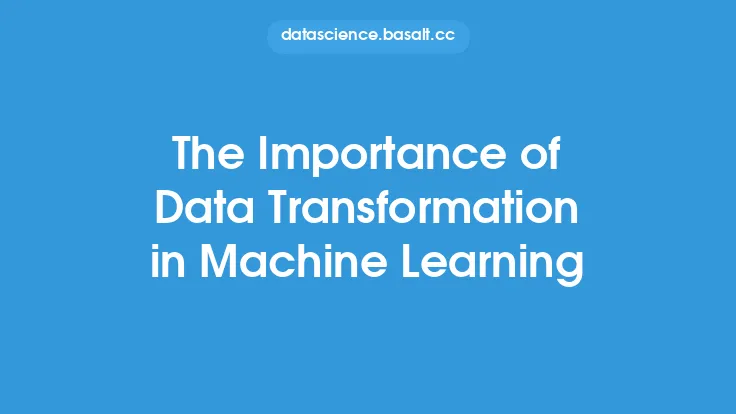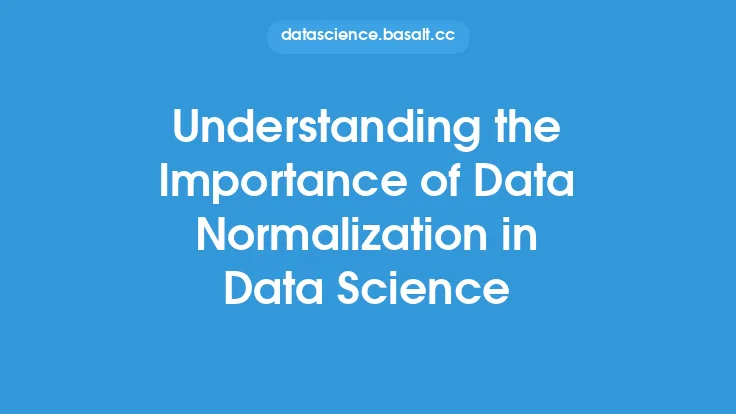Data transformation is a critical component of the data science process, playing a vital role in preparing raw data for analysis and modeling. The primary goal of data transformation is to convert data from its original form into a format that is more suitable for analysis, modeling, and visualization. This process involves a series of steps that help to improve the quality, consistency, and reliability of the data, ultimately leading to more accurate and informative insights.
Introduction to Data Transformation
Data transformation is an essential step in the data science workflow, as it enables data scientists to work with data that is consistent, complete, and accurate. The process of data transformation involves a range of techniques, including data cleaning, data normalization, data aggregation, and data feature engineering. Each of these techniques serves a specific purpose, such as handling missing values, reducing data dimensionality, and improving data quality. By applying these techniques, data scientists can transform raw data into a format that is more suitable for analysis and modeling, leading to more reliable and accurate results.
Types of Data Transformation
There are several types of data transformation, each with its own specific purpose and application. Some of the most common types of data transformation include:
- Data cleaning: This involves identifying and correcting errors, inconsistencies, and inaccuracies in the data, such as handling missing values, removing duplicates, and correcting data entry errors.
- Data normalization: This involves scaling numeric data to a common range, usually between 0 and 1, to prevent differences in scales from affecting the analysis.
- Data aggregation: This involves combining multiple data points into a single value, such as calculating the mean or sum of a set of values.
- Data feature engineering: This involves creating new features or variables from existing ones, such as extracting relevant information from text data or creating new variables through mathematical transformations.
Each of these types of data transformation serves a specific purpose, and the choice of which one to use depends on the nature of the data and the goals of the analysis.
Data Transformation Techniques
There are several data transformation techniques that can be used to prepare data for analysis and modeling. Some of the most common techniques include:
- Log transformation: This involves applying the logarithm function to numeric data to reduce skewness and improve normality.
- Standardization: This involves subtracting the mean and dividing by the standard deviation to scale numeric data to a common range.
- Encoding: This involves converting categorical data into numeric data, such as using one-hot encoding or label encoding.
- Dimensionality reduction: This involves reducing the number of features or variables in the data, such as using principal component analysis (PCA) or singular value decomposition (SVD).
Each of these techniques has its own strengths and weaknesses, and the choice of which one to use depends on the nature of the data and the goals of the analysis.
Importance of Data Transformation
Data transformation is a critical step in the data science process, as it enables data scientists to work with high-quality data that is consistent, complete, and accurate. The importance of data transformation can be seen in several areas, including:
- Improved data quality: Data transformation helps to improve the quality of the data by handling missing values, removing duplicates, and correcting errors.
- Increased accuracy: Data transformation helps to increase the accuracy of the analysis by reducing the impact of outliers, skewness, and other data quality issues.
- Better model performance: Data transformation helps to improve the performance of machine learning models by providing them with high-quality data that is consistent and accurate.
- Faster insights: Data transformation helps to speed up the analysis process by providing data scientists with a clear and consistent view of the data, enabling them to quickly identify patterns and trends.
Challenges and Limitations of Data Transformation
While data transformation is a critical step in the data science process, it also presents several challenges and limitations. Some of the most common challenges and limitations include:
- Data complexity: Data transformation can be challenging when dealing with complex data sets that have multiple variables, missing values, and outliers.
- Data volume: Data transformation can be time-consuming and computationally expensive when dealing with large data sets.
- Data variety: Data transformation can be challenging when dealing with diverse data sets that have different formats, structures, and quality.
- Over-transformation: Data transformation can lead to over-transformation, where the data is transformed too much, leading to a loss of important information and patterns.
Best Practices for Data Transformation
To overcome the challenges and limitations of data transformation, it is essential to follow best practices that ensure high-quality data transformation. Some of the best practices include:
- Understand the data: Before transforming the data, it is essential to understand the nature of the data, including its format, structure, and quality.
- Document the transformation: It is essential to document the transformation process, including the techniques used, the parameters applied, and the results obtained.
- Validate the transformation: It is essential to validate the transformation process, including checking for errors, inconsistencies, and inaccuracies.
- Monitor the transformation: It is essential to monitor the transformation process, including tracking the performance of the models and the quality of the insights obtained.
Conclusion
Data transformation is a critical component of the data science process, playing a vital role in preparing raw data for analysis and modeling. By applying various data transformation techniques, data scientists can improve the quality, consistency, and reliability of the data, leading to more accurate and informative insights. While data transformation presents several challenges and limitations, following best practices can help to overcome these challenges and ensure high-quality data transformation. As data science continues to evolve, the importance of data transformation will only continue to grow, making it an essential skill for data scientists to master.





